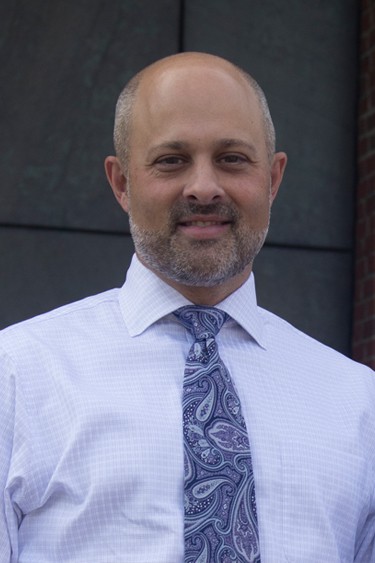Feature, Winter | Spring 2020
Unnatural Quiet
By Dean of the May School of Arts & Sciences Peter Ubertaccio
I’ve walked around an empty campus over these past few weeks. Normally, when you arrive before 8 a.m., you encounter our priests heading to the Chapel of Mary for morning Mass, athletes in early practice, faculty and students walking to class, our colleagues in food and janitorial services getting ready for the day ahead. In warm weather, you catch a glimpse of someone kneeling in prayer at the Grotto.
Now there is an unnatural quiet. The response to the COVID-19 outbreak has emptied our campus of all that gives it life: students, faculty, coaches, priests and religious, staff, our neighbors and guests.
As we responded to public health authorities, we issued a call to move it all online. But, what we are undertaking now is not a great experiment in online learning. This is a quick adaptation to an emergency.
Online learning provides a rich and rigorous opportunity for students. It takes time to properly develop, administer and assess. It can live in harmony with face-to-face learning as an option that provides flexibility for students and a connectedness that is valuable and necessary to cultivate in our highly digital society.
As many of us on Catholic colleges and elsewhere ramp up remote learning, some will naturally wonder, is this the moment our higher education system becomes fully online? You are hearing this a lot in some sectors: The changes we are seeing now will become the way we live even after the crisis is over. Is this the moment we begin replacing residential campuses?
 Wandering around an empty campus reminds us of the many reasons they exist and why Catholic colleges, in particular, have existed for centuries: a holistic face-to-face experience that helps to develop the intellectual, spiritual, physical and communal needs of young people. At its best, this is what Catholic college is: A community of faith engaged in learning and engaged with each other. You can accomplish some of this in online modes of delivery. But not all of it.
Wandering around an empty campus reminds us of the many reasons they exist and why Catholic colleges, in particular, have existed for centuries: a holistic face-to-face experience that helps to develop the intellectual, spiritual, physical and communal needs of young people. At its best, this is what Catholic college is: A community of faith engaged in learning and engaged with each other. You can accomplish some of this in online modes of delivery. But not all of it.
What would we lose if our only connections were digital and not on the quad or in the classroom, in worship in the chapel, in the theater, on the athletic field?
We’d lose community—so important to our identity and to shaping the next generation of informed citizens—and the benefits of social interaction and learning. This moment will remind us what we need and what a residential college education can provide.
We need faculty scholars, coaches, chaplains and staff members to mentor, encourage and teach young people in person. They will join the world that is only ever going to be partly digital.
Students need us to provoke their critical thinking, listen to their concerns, help guide them toward solutions, offer feedback and assessment. They need a place to try, to question, to fail and to try again. A campus that encourages interaction is better placed to do this than any other learning environment.
And we need them. Faculty-scholars see the world through a different lens when young people encounter texts, authors, calculations and experiments for the first time. We are better teachers for the experience and better prepared to consider the needs of the next generation of students.
Some of the changes this crisis is forcing us to make will, I hope, indeed become permanent. More people should be working from home, not clogging trains and roads and worsening climate change. We should work to ensure there is no digital divide. We should have greater appreciation for how so many of our fellow citizens have to balance work and personal lives, particularly when illness strikes. And I hope more of us will see quarantine less as a punishment, and more as a way to engage with our children, our parents and—when we can help from a safe social distance—our neighbors in need. It might spur more quiet prayer.
But my walk across the quiet campus made it clear to me that the change in the way we teach can’t come at the cost of our precious quad communities. A holistic education in isolation is simply not the same.
Peter Ubertaccio [pictured above] is the dean of the Thomas and Donna May School of Arts & Sciences at Stonehill.
